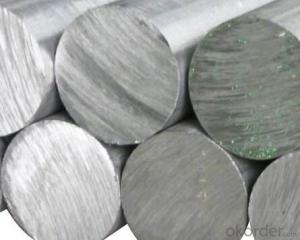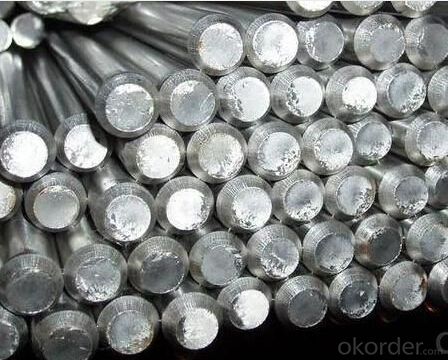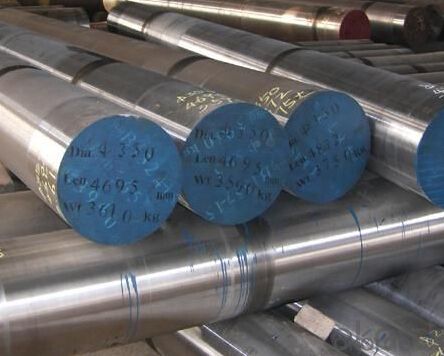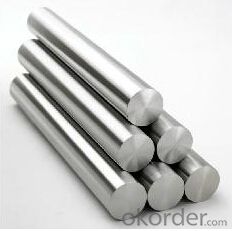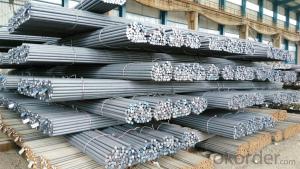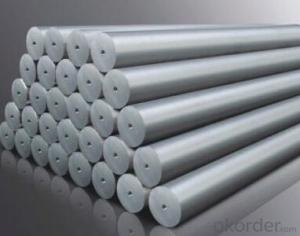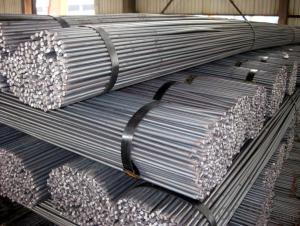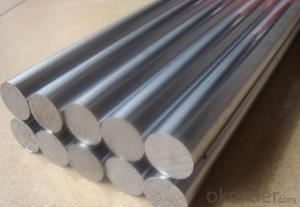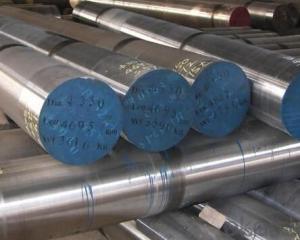Diameter 30-60mm Bearing Steel Round Bar
- Loading Port:
- Tianjin
- Payment Terms:
- TT or LC
- Min Order Qty:
- 500 m.t.
- Supply Capability:
- 1000000 m.t./month
OKorder Service Pledge
OKorder Financial Service
You Might Also Like
Product Description:
OKorder is offering Diameter 30-60mm Bearing Steel Round Bar at great prices with worldwide shipping. Our supplier is a world-class manufacturer of steel, with our products utilized the world over. OKorder annually supplies products to European, North American and Asian markets. We provide quotations within 24 hours of receiving an inquiry and guarantee competitive prices.
Product Applications:
Diameter 30-60mm Bearing Steel Round Bar are ideal for structural applications and are widely used in the construction of buildings and bridges, and the manufacturing, petrochemical, and transportation industries.
Product Advantages:
OKorder's Diameter 30-60mm Bearing Steel Round Bar are durable, strong, and resist corrosion.
Main Product Features:
· Premium quality
· Prompt delivery & seaworthy packing (30 days after receiving deposit)
· Corrosion resistance
· Can be recycled and reused
· Mill test certification
· Professional Service
· Competitive pricing
Product Specifications:
Grade | AISI 52100, ASTM E52100, DIN 1.3505,JIS SUJ2, GCr15 |
Dimensions | Diameter: 30-60mm Length: 2000-13000mm or as required |
Shape | Round Bar |
Type | Alloy Steel Bar |
Delivery Condition | Black Surface |
Material | Bearing Steel |
Technique | Hot Rolled |
Usage and Applications of Bearing Steel Round Bar
Bearing steels are used for ball and roller bearing applications and are comprised of low carbon steels and high carbon through harden able steel.
First the famous 1C-1.5Cr steel from which the majority of bearings are made. Its structure is apparently well-understood and the focus is on purity in order to avoid inclusions which initiate fatigue during rolling contact. Then there is the M50 steel and its variants, from which bearings which serve at slightly higher temperatures in aeroengines are manufactured, based on secondary-hardened martensite.
Tapered roller bearing are generally used to support combined load mainly consisting of radial load. Their cups are separable for easy assembling ,During mounting and using, radial clearance and axial clearance can be adjusted and preloaded mounting can be made.
Packaging & Delivery of Bearing Steel Round Bar
Packaging Detail: ASTM 52100 Steel in seaworthy packing or on customer request; Packed in bundles with standard export sea-worthy package or as customer require
Delivery Detail: 45 days after confirmed
Trade terms: FOB, CFR, CIF ou as customer's required
MOQ: 25 tons or at customer's demands. If the quantity is good, the price will be better.
Processing of Bearing Steel Round Bar
The processing of Bearing Steel Round Bar is hot rolled (strictly control sulphur, phosphorus and non-metallic inclusions content and distribution)
Chemical Composition of Bearing Steel Round Bar
C | Si | Mn | Cr | Ni | Cu |
Equal or less than | |||||
0.95-1.05 | 0.15-0.35 | 0.25-0.45 | Cr:1.40-1.65 | 0.30 | 0.25 |
All products' chemical composition and specification can be design according to customers' requirement.
Note of Bearing Steel Round Bar
1. According to national standard (GB) for our products, if not, supply according to national standards (GB) or agreement.
2. We can not only provide electric furnace +LF+VD and electros lag re-melting (ESR) steel forging materials, but also forging products of piece, bar, etc.
3. Our company is equipped with roll equipment and can provide our customers with roll billets or finished.
4. Please send us your detailed specifications when inquire. We will reply to you ASAP.
5. Certificate of quality is issued in English, in addition the normal terms, production process, the mechanical property (yield strength, tensile strength, elongation and hardness. forged ratio, UT test result, Grain size, heat treatment methods and the sample of is shown on the certificate of quality.
FAQ:
Q1: Why buy Materials & Equipment from OKorder.com?
A1: All products offered byOKorder.com are carefully selected from China's most reliable manufacturing enterprises. Through its ISO certifications, OKorder.com adheres to the highest standards and a commitment to supply chain safety and customer satisfaction.
Q2: How do we guarantee the quality of our products?
A2: We have established an advanced quality management system which conducts strict quality tests at every step, from raw materials to the final product. At the same time, we provide extensive follow-up service assurances as required.
Q3: How soon can we receive the product after purchase?
A3: Within three days of placing an order, we will begin production. The specific shipping date is dependent upon international and government factors, but is typically 7 to 10 workdays.
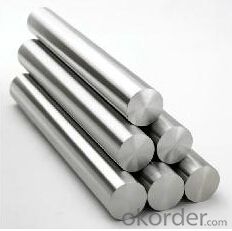
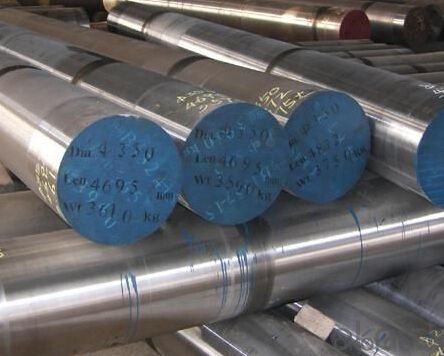
- Q: How does special steel contribute to the automotive suspension spring industry?
- Special steel contributes to the automotive suspension spring industry by providing enhanced strength, durability, and flexibility. This type of steel allows suspension springs to withstand the constant stress and load of vehicle weight, while also providing optimal ride comfort and handling. The high-quality properties of special steel help suspension springs to maintain their shape and performance over time, ensuring a smooth and stable ride for vehicles.
- Q: How does special steel contribute to reducing product costs while maintaining quality?
- Special steel contributes to reducing product costs while maintaining quality through several ways. Firstly, special steel possesses enhanced strength and durability, allowing manufacturers to produce products with thinner gauges or smaller dimensions, reducing material usage and overall costs. Additionally, its superior corrosion resistance and longevity ensure that the products have a longer lifespan, reducing the need for frequent replacements. Moreover, special steel's exceptional machinability enables efficient production processes, reducing labor costs and increasing productivity. Lastly, its high precision and consistency in manufacturing contribute to minimizing defects and waste, resulting in cost savings and improved product quality. Overall, special steel's unique properties and characteristics enable manufacturers to optimize production, thereby reducing costs without compromising on product quality.
- Q: What are the different types of alloy steel?
- There are several different types of alloy steel, including stainless steel, tool steel, high-strength low-alloy steel, and maraging steel.
- Q: How does special steel contribute to the defense equipment industry?
- The defense equipment industry heavily relies on special steel, which offers superior strength, durability, and performance characteristics essential for manufacturing high-quality military equipment. This type of steel is specifically engineered to meet the demanding requirements of defense applications, ensuring the safety and effectiveness of military personnel and operations. A significant contribution of special steel to the defense equipment industry lies in its ability to withstand extreme conditions and environments. Military equipment often operates in harsh conditions, including extreme temperatures, high pressures, corrosive environments, and impact forces. Special steel is designed to maintain its structural integrity and performance under these challenging conditions, providing a reliable and long-lasting solution for defense equipment. Furthermore, special steel possesses exceptional strength and toughness, making it optimal for producing armored vehicles, tanks, and military aircraft. It provides a high level of protection against ballistic threats and can endure projectile impacts and explosions. The utilization of special steel in defense equipment guarantees the safety of military personnel and enhances their survivability in combat situations. Additionally, special steel is indispensable for the production of cutting-edge weaponry and munitions. It is employed in the manufacturing of firearms, missiles, and artillery systems due to its excellent mechanical properties and ability to withstand high pressures. Special steel also enables precision engineering, ensuring the accuracy and reliability of military firearms and projectiles. Moreover, special steel contributes to the defense equipment industry by supporting technological advancements. As technology continues to evolve, the defense sector requires materials that can meet the demands of modern warfare. Special steel can be tailored and optimized to meet specific performance requirements, allowing for the development of advanced defense systems such as stealth technology, electronic warfare, and precision-guided munitions. In conclusion, special steel plays a crucial role in the defense equipment industry by providing the necessary strength, durability, and performance characteristics required for military applications. It guarantees the safety and effectiveness of defense personnel and equipment, withstands extreme conditions, facilitates the production of advanced weaponry, and supports technological advancements in the defense sector.
- Q: What is the role of special steel in the automotive industry?
- Special steel plays a crucial role in the automotive industry by providing strength, durability, and resistance to wear and corrosion for various components. It is used in the production of engine parts, chassis components, transmission systems, and safety features, ensuring enhanced performance, reliability, and safety in vehicles.
- Q: How does corrosion-resistant steel protect against chemical attacks?
- Corrosion-resistant steel protects against chemical attacks by forming a protective layer on its surface that prevents the penetration of corrosive substances. This layer, usually composed of chromium oxide, acts as a barrier that shields the underlying steel from the damaging effects of chemicals, thus preserving its structural integrity and preventing corrosion.
- Q: What is the impact of impurities on the machinability of special steel?
- The impact of impurities on the machinability of special steel can be significant. Impurities in the steel, such as sulfur, phosphorus, and non-metallic inclusions, can adversely affect the performance and machinability of the material. Sulfur is commonly present in steel as an impurity, and it tends to form brittle compounds that can reduce the machinability of the steel. High levels of sulfur can lead to increased tool wear, poor surface finish, and decreased cutting tool life. Therefore, it is essential to control the sulfur content in special steel to ensure good machinability. Phosphorus is another impurity that can have a negative impact on machinability. It tends to form hard and brittle compounds, which can cause tool chipping, breakage, and poor chip control. High levels of phosphorus can also lead to reduced cutting tool life and surface finish. Non-metallic inclusions, such as oxides, sulfides, and silicates, are also significant impurities in steel. These inclusions can act as stress concentrators, leading to increased tool wear and decreased machining quality. Large inclusions can cause tool breakage and interrupt the machining process. Therefore, minimizing the presence of non-metallic inclusions is crucial for improving the machinability of special steel. Overall, impurities in special steel can have a detrimental effect on its machinability. To ensure good machinability, it is important to control and minimize the levels of impurities like sulfur, phosphorus, and non-metallic inclusions. This can be achieved through careful selection of raw materials, refining processes, and quality control measures during the manufacturing of special steel.
- Q: What are the different types of precipitation-hardening steel?
- There are several different types of precipitation-hardening steel, including 17-4 PH, 15-5 PH, 13-8 PH, and 17-7 PH. These alloys are known for their ability to be strengthened through a precipitation hardening process, which involves a combination of heat treatment and aging. Each type of precipitation-hardening steel has its own unique composition and properties, making them suitable for various applications in industries such as aerospace, automotive, and medical.
- Q: How does special steel contribute to the mining machinery industry?
- The mining machinery industry relies heavily on special steel, which provides exceptional strength, durability, and resistance to wear and corrosion. This specific type of steel is engineered to withstand the harsh conditions typically encountered in mining operations. In the mining machinery industry, equipment such as drills, excavators, loaders, crushers, and conveyor systems face extreme stress, heavy loads, and abrasive materials. Various parts of these machines, including buckets, tracks, cutting edges, gears, and hydraulic components, incorporate special steel components. The high strength and toughness of special steel ensure that mining machinery can endure the immense forces and impacts involved in mineral excavation, hauling, and processing. This durability extends the lifespan of the equipment, reducing the need for frequent replacements and minimizing downtime, resulting in cost savings for mining companies. Special steel's resistance to wear and corrosion is crucial in the mining industry. The presence of abrasive materials and corrosive substances in the mining environment can cause rapid deterioration of machinery components. However, special steel alloys are designed to resist wear and corrosion, enhancing the longevity and performance of mining machinery. Additionally, special steel allows mining machinery to operate efficiently and effectively. Its high strength-to-weight ratio allows for the construction of lightweight yet robust equipment, improving mobility and productivity in mining operations. The use of special steel also enables the design of complex components with intricate shapes, ensuring optimal functionality and performance. Overall, special steel is an essential material in the mining machinery industry. Its exceptional strength, durability, resistance to wear and corrosion, and ability to enhance efficiency make it a vital component in the design and construction of mining equipment. By incorporating special steel, mining machinery can withstand the challenging conditions and heavy-duty tasks involved in mining operations, ultimately contributing to increased productivity, reduced costs, and improved safety in the industry.
- Q: How is special steel used in the aerospace sector?
- The aerospace sector heavily relies on special steel due to its distinctive properties, which make it suitable for various applications. One primary application in the aerospace industry involves using special steel to manufacture aircraft engine components. Turbine blades, shafts, and casings, which are exposed to extreme temperatures, pressures, and stresses, benefit from special steel's exceptional heat resistance, high strength, and superior mechanical properties. These qualities enable the engine parts to endure harsh conditions, ensuring optimal performance and safety. Special steel is also used in constructing aircraft structures like wings, fuselage, landing gears, and critical components. These structures must be lightweight yet strong enough to withstand flight forces. Special steel alloys, particularly stainless steel, strike a balance by providing excellent strength-to-weight ratios and corrosion resistance. Furthermore, aerospace fasteners, including bolts, nuts, and screws, rely on special steel's exceptional strength and durability to maintain the aircraft's structural integrity. Titanium alloys, known for their lightweight nature, high strength, and corrosion resistance, are frequently employed for this purpose. Additionally, special steel finds application in aerospace tooling and equipment production. Molds, dies, jigs, and fixtures used during manufacturing processes require materials that are robust, wear-resistant, and capable of withstanding high temperatures and pressures. Special steel, with its outstanding hardness, toughness, and heat resistance, proves to be ideal for these applications. In conclusion, special steel is indispensable in the aerospace sector as it provides the necessary properties for aircraft engine components, structures, fasteners, and tooling. Its unique characteristics, including high strength, heat resistance, lightweight, and corrosion resistance, contribute to the production of reliable and high-performance aerospace systems.
Send your message to us
Diameter 30-60mm Bearing Steel Round Bar
- Loading Port:
- Tianjin
- Payment Terms:
- TT or LC
- Min Order Qty:
- 500 m.t.
- Supply Capability:
- 1000000 m.t./month
OKorder Service Pledge
OKorder Financial Service
Similar products
Hot products
Hot Searches
Related keywords
